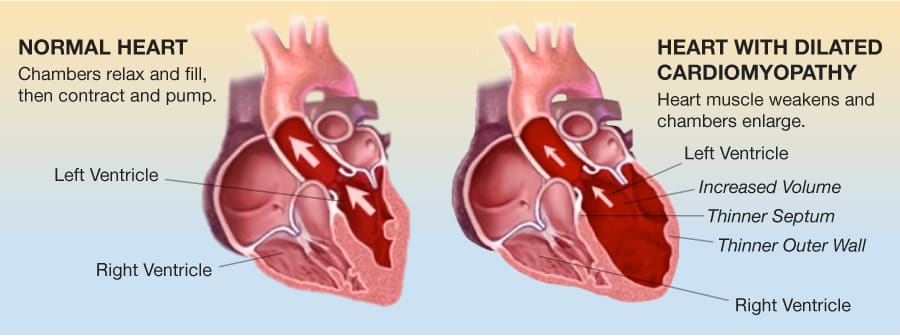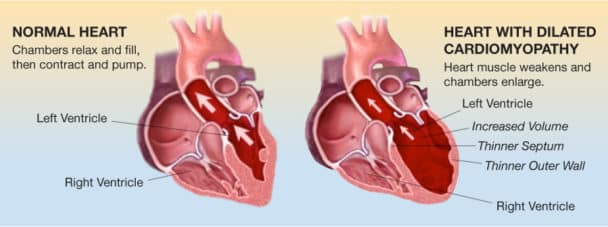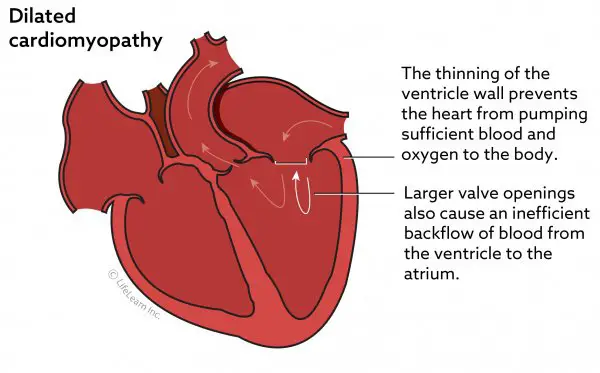How Long Can You Live With Dilated Cardiomyopathy?
Dilated Cardiomyopathy Survival
Dr. Sinatra, a natural cardiologist, suggests that heart disease is a “metabolic disease” and it is caused mainly by a lack of nutrients and minerals.
Dr. Sinatra coined the phrase “awesome foursome” to describe four supplements that are crucial in helping the heart get better from dilated cardiomyopathy. Research and studies have shown that people are living longer lives with cardiomyopathy.
Magnesium Taurate
Magnesium is the heart’s minerals. Evidence shows that the majority of people with heart disease have low magnesium. Life Extensions make excellent magnesium.
Related Articles
Normal troponin levels
Facts about high blood pressure
LAD widow maker artery
Ribose 
Ribose is a sugar that the heart loves! Ribose occurs naturally in all living cells. It is a simple sugar that begins the metabolic process for ATP production.
CoQ10
Coenzyme Q10, also called CoQ10 or Ubiquinone, is a natural substance essential to cellular energy production. It is an antioxidant that scavenges free radicals throughout the body and is also involved in maintaining normal heart function.
LCarnitine
Carnitine is important for providing energy to muscles and has been described as a “conditionally essential” nutrient for humans. 95% of all carnitine stores in the body are found in muscle tissue.
Causes of Dilated Cardiomyopathy
I have cardiomyopathy. I was diagnosed with cardiomyopathy when I was 40. I am now 51 years of age.
I was born with a congenital heart defect and it was not diagnosed until I was 40. I researched Dr. Sinatra’s “awesome foursome”.
The awesome foursome is magnesium, carnitine, Coq10, and ribose. I started taking these supplements and my ejection fraction improved from 15% to 40% I was also taking medications.
Medical Therapy for Dilated Cardiomyopathy
Children with Cardiomyopathy
Diuretic Therapy for Dilated Cardiomyopathy
Common Types of Medications for Dilated Cardiomyopathy Treatment Include:
• Digoxin (taken by mouth): improves the contraction of the heart. Side effects include low heart rate, and, high blood levels, vomiting, and abnormal heart rhythm.
Life Expectancy
How long can you live with dilated cardiomyopathy? I was also diagnosed with dilated cardiomyopathy. I am 51 years of age and I work a full-time job as a nurse. I average 6000 steps a day. My dilated cardiomyopathy stemmed from a congenital heart defect. My congenital heart defect is called Left Ventricle Non-Compaction.
Can Dilated Cardiomyopathy Be Reversed?
Can dilated cardiomyopathy be reversed? I get this question often. As a cardiac nurse, I have seen some cases of dilated cardiomyopathy reverse itself. If the cause of the dilated cardiomyopathy is identified and treated, the dilated cardiomyopathy can sometimes be reversed.
Natural Supplements to Help Dilated Cardiomyopathy




- I take Life Extension magnesium products because I have found them to be of quality and fresh. I also use
Magnesium Taurate from Cardiovascular Research The taurine is an amino acid which has excellent benefits for the heart. - This is the CoQ10 with BioPerine that I take to heal my heart naturally. A plethora of studies has been done that prove the benefit of Coq10 for the heart. Coq10 should also be taken if someone is taking a statin.
- L-Carnitine is an amino acid that is part of the “awesome foursome”. Carnitine supports the mitochondria.
- This is the Ribose that I take. Ribose gives me so much energy. Ribose also supports the mitochondria.
Dilated Cardiomyopathy Diet
A dilated cardiomyopathy diet should include an anti-inflammatory diet. An anti-inflammatory diet includes low sugar, low processed foods, and low grains. Diet plays a big role in treating dilated cardiomyopathy.
Conclusion
How long can you live with dilated cardiomyopathy? You can live a good long time. The new technology, new medicines, and lifestyle adjustments you make can have an awesome impact on your quality of life.
My name is Phyllis Robinson MSN, RN. I have been a Registered Nurse for 27 years in the Cardiac Intensive Care Unit. I am passionate about cardiac care and heart disease. I also want this blog to be an educational tool that people can refer to for traditional and alternative treatment. I will blog on heart disorders such as high blood pressure, congestive heart failure, cardiomyopathy, and high cholesterol.
I received my Nursing degree from Baltimore Community College.
I went on to receive my Masters in Nursing from Walden University
I have worked for almost 30 years in Critical Care with a focus on heart health. I am an advocate of preventive healthcare.




Can you take the awedome foursome for dialated heart while on medication from the doctors ?
Yes I have heart disease and I take it every day!
Can i use magnesium ribose etc while using a beta blocker? I’m scared :’(
I take the magnesium every day with a beta blocker. Just make sure you monitor your heart rate.
Magnesium is gold to the heart.
Nurse Robinson
I’m on entresto, carvedilol, spironlatone, tresomide, I also take Hawthorne Berries, Apple Cider vinegar. So, now I will look for the awesome four. I also have used magnesium citrate for years to prevent kidney stones. I had no blockages nor clots. I drank a cocktail of cayanenne pepper, garlic & ginger. Prior to hospitalization. Please help me on my journey.
The awesome foursome which is magnesium, carnitine, coq10, and ribose.
Thank you Phyllis.
Its been 4 years since i found your site with a Heart Energy Efficiency of 21% and i am still here.
Thanks to your advice on the awesome foursome.
Thank you Katy for your support! It means a lot !
Nurse Phyllis